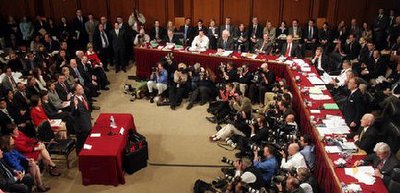To Grill or Not to Grill: What's Best for the Country?
We are consistently in awe of the framers of the US Constitution. They managed to provide a blueprint for democracy where none ever existed before. Those brilliant men created a document that is specific enough to clearly enumerate our freedoms while being broad enough that it can more or less logically be reinterpreted as needed when times change.
As mostly religious men, it's no secret that the framers took many a cue from the Bible - which itself is an amazingly flexible document that can be interpreted in an infinite number of ways. However, the wonderment of the constitution sometimes becomes a devilish thing - one that can lead to deep divisions in the country as it tries so earnestly to bring us all together. The hearings for Supreme Court nominee Samuel Alito are a case in point.
Over the past few decades, more and more political points have been scored by chief executives with a thirst for leaving their "legacy" to the generations yet to come. In many cases, this legacy is one of the most important and long lasting things they will ever leave. Their nominees will serve long after they are gone and the justice's decisions will live on as precedents long after the they have left the bench. There is perhaps no other thing a President can do that has as long-lasting an effect on the lives of US citizens.
The framers, and common sense, would suggest that of all the things present in our political system, the decisions on who to nominate should be the least political. If the framers had thought judicial nominations should be political affairs they would have made the judiciary an elected one. Instead, they made it the sole unelected branch of government precisely to keep politics out of the mix. Unfortunately, to create and maintain an independent judiciary the framers made one critical mistake - they left nominations in the hands of politicians and the confirmations in the hands of yet other politicians.
Unlike the framers - who by and large were sensible, rational men who knew the difference between politics and the good of the country - modern politicians seem to have lost sight of the distinction. It's now common practice to select nominees based almost purely on political necessities. In some cases, the nominees are blatantly political like Harriet Miers or Robert Bork. In others, they are selected with a little more care for masking their political stripes, but still largely upon their perceived position on a very small number of core issues (these days abortion and war powers are the big ones). It seems as though modern presidents pick nominees based on their ability to divide rather than their ability to make sound legal arguments. It is part of the insatiable hunger of the "base" for fresh meat to lord over the losers.
This political tinkering has left a population that is deeply skeptical of almost every nominee. The result is that nominees are no longer judged on the legal decisions they may make, but on whether or not they left a pubic hair on a can of Coke or wrote an ill-advised memo at some time in the past.
Alito - who by all accounts is a decent enough guy with a relatively good reputation as a jurist - is finding himself being grilled about the same one or two big issues instead of the vast panoply he will face if he takes the bench. Any decisions he makes on abortion or war powers will be greatly outnumbered by the decisions he will make on corporate law, discrimination, or any number of other subjects.
While we would prefer a justice who would take stands in keeping with our personal view of the Constitution, that isn't a justice's place. A justice makes decisions based on the needs of all citizens as they are enumerated in the Constitution. Because times change and new legal issues arise, justices not only must be nimble and thoughtful about the law, but also free of politics to make the best decisions possible. A justice chosen solely on his political merits will fail dismally at the task.
As we're bombarded with hundreds of television and print ads advocating one position or another, it is our duty as citizens to set all the empty rhetoric aside. We must look at the nominee as fairly as possible, regardless of our personal desires. To take the politics out of the situation, citizens must lead the way. We must become even more careful and deliberative in the absence of leadership from our professional politicians. While acknowledging that no human can be completely impartial, there is only one standard for choosing a justice - can the person have an open mind and make a rational legal argument.
The Supreme Court serves as the conscience of our society. We cannot have a rational and fair one unless we accept the fact that sometimes the justices will decide things that go against our personal desires. The best we can hope for is that their decisions are fair and our personal arguments are carefully and truthfully considered.
We can ask no more because we aren't entitled to more and because it is the right thing to do for the country.
Truth Told by Omnipotent Poobah, Tuesday, January 10, 2006







